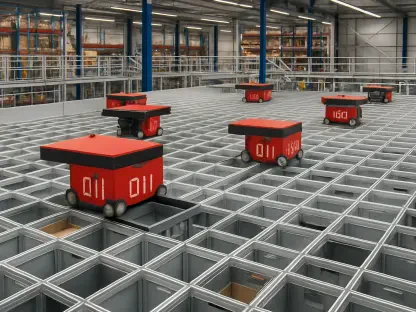In a world where logistics and supply chain resilience are more critical than ever, the British International Freight Association (BIFA) stands out as a key player in combatting freight crime. Today, we’re joined by Marco Gaietti to explore the strategic partnership between BIFA and the National Vehicle Crime Intelligence Service (NaVCIS) and its impact on the industry.
Can you explain the nature of BIFA’s partnership with the National Vehicle Crime Intelligence Service (NaVCIS)?
BIFA has renewed its collaboration with NaVCIS to tackle the growing threat of freight crime across the UK. The partnership involves BIFA providing financial backing to NaVCIS, which is vital in preventing and investigating vehicle crimes, particularly those related to freight theft and cargo security.
What specific role will BIFA play in supporting NaVCIS’s efforts against freight crime?
BIFA will be a critical partner by supplying the necessary funding that enables NaVCIS to continue its essential work. In return, BIFA will receive regular intelligence updates about crime trends and where incidents are most prevalent, allowing for a more comprehensive response from the logistics community.
How does the financial support from BIFA help NaVCIS in its mission?
The financial support from BIFA is pivotal for NaVCIS, as it relies heavily on industry funding to pursue its initiatives. This funding allows NaVCIS to carry out more thorough investigations and develop strategies that contribute significantly to reducing crime rates within the freight industry.
What kind of intelligence will BIFA receive from NaVCIS, and how often will these briefings occur?
BIFA is set to receive frequent intelligence briefings from NaVCIS that focus on the latest truck crime trends, new criminal tactics, and crime hotspots. Such timely information will help BIFA members stay alert and prepared for potential threats.
How will BIFA disseminate the intelligence received from NaVCIS to its corporate membership?
BIFA plans to share this crucial intelligence through various channels, ensuring that its corporate members are well-informed. This could include reports, digital communications, or even through specially organized meetings and forums.
Can you discuss the importance of keeping freight forwarders and logistics companies informed about truck crime trends?
Staying informed is critical for any business, particularly in logistics. Knowing the current crime trends enables companies to implement effective security measures, thereby safeguarding their assets and operations from potential threats.
What proactive steps can BIFA members take to protect their operations with the intelligence provided?
Members can use the intelligence to reassess and adapt their security procedures, invest in stronger protective measures, and train their staff to anticipate and appropriately respond to threats, significantly enhancing their operational resilience.
In what ways do security measures contribute to a safer and more resilient supply chain?
Robust security measures ensure the smooth running of supply chains by minimizing disruptions caused by theft and other crimes. They build trust with clients and partners by demonstrating a commitment to protecting goods and ensuring timely deliveries.
Why is freight crime considered a growing concern in the industry?
Freight crime disrupts supply chains and results in significant financial losses. As the global logistics network becomes more complex, the opportunities for crime increase, making it imperative for industry stakeholders to stay vigilant and proactive.
How does the partnership with NaVCIS underscore BIFA’s commitment to promoting safety and reducing freight crime?
This partnership highlights BIFA’s dedication to not just supporting its members but also contributing to the wider community effort against crime. By collaborating with law enforcement agencies like NaVCIS, BIFA reinforces its role in enhancing overall industry safety.
Can you give us more information about the planned documentary-style episode of BIFA TV?
BIFA plans to produce a feature-length episode for BIFA TV, designed to showcase the work done by NaVCIS. This documentary aims to raise awareness among members by providing real-world examples of anti-crime efforts at notable landmarks such as Beaconsfield services and the Red Lion truck stop.
What will the documentary focus on, and why were locations like Beaconsfield services and the Red Lion truck stop chosen for case studies?
The documentary will highlight case studies that demonstrate how NaVCIS tackles crime using actual events at these locations. Beaconsfield and Red Lion were chosen because they are strategic points where logistics activities are high, making them relevant examples of crime prevention in action.
Why is NaVCIS Freight’s specialization on cargo crime important for the industry?
NaVCIS Freight’s focus on cargo crime allows for a more specialized and informed approach to tackling the specific challenges freight operators face. This specialization helps identify and anticipate trends, creating more effective responses and strategies.
How does NaVCIS analyze data to identify patterns of criminal activity?
NaVCIS employs advanced data analytics to recognize patterns in criminal activity. This process helps them pinpoint hotspots and common tactics, leading to more focused strategies and successful interventions.
What role do industry partners, like BIFA, play in supporting NaVCIS’s targeted investigations?
Industry partners provide not only financial support but also crucial logistical insight and reach. Their involvement ensures that investigations are well-funded and grounded in industry realities, making the interventions more practical and effective.
How critical is industry stakeholder funding for NaVCIS’s operations?
Stakeholder funding is central to NaVCIS’s capacity to tackle crime. Without it, maintaining the level of specialized operations and investigations would be challenging, highlighting the critical nature of such collaborative efforts.
What does the support from BIFA highlight about the value of cross-sector cooperation in the context of freight crime prevention?
BIFA’s support illustrates how essential it is for different sectors to collaborate for a common cause. Cross-sector cooperation leverages the strengths of various stakeholders, leading to more comprehensive and sustainable crime prevention solutions.
Do you have any advice for our readers?
Stay informed and vigilant. Being proactive about security measures can mitigate risks substantially. Leverage partnerships and shared intelligence to enhance your operations’ resilience in the face of emerging threats.









